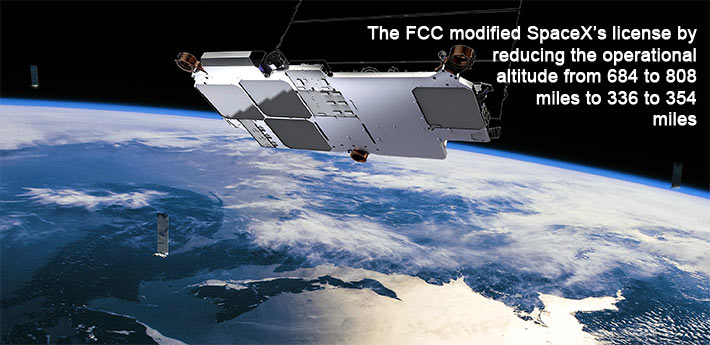
The FCC on Tuesday voted to approve a SpaceX plan to deploy some Starlink satellites at a lower earth orbit than planned as part of its push to offer space-based broadband internet.
Elon Musk’s SpaceX had asked the FCC for approval to fly 2,824 satellites at a lower orbit as part of the plan to provide high-speed broadband internet services to people who currently lack access.
The FCC modified their license by reducing the operational altitude from 684 to 808 miles to 336 to 354 miles.
Viasat, Hughes, and Kuiper Systems had previously challenged SpaceX’s claims. Viasat and Hughes argued that SpaceX’s claims of the public interest benefits of its system are unsubstantiated and the agency should not rely on them as justification for granting SpaceX’s application.
Viasat claimed that SpaceX has not provided analysis demonstrating how the latency has changed by reducing the satellites’ operating altitude. Viasat also argued that SpaceX’s system, as currently authorized, can provide service worldwide, including polar regions.
SpaceX informed the FCC that the change in altitude would improve space safety, reduce power flux density emissions to improve the interference environment and lower “elevation angles to improve the customer experience.”
“SpaceX’s operations at lower altitudes and significant maneuverability should result in lower collision risk and an improved orbital debris environment,” the FCC said in its order.
The FCC also said SpaceX agreed to accept that their lower-altitude satellites may encounter interference from satellites deployed under Amazon’s Kuiper Systems satellite project.
Amazon welcomed the FCC order for placing “clear conditions on SpaceX, including requirements that it remain below 580 km and accept additional interference resulting from its redesign. These conditions address our primary concerns regarding space safety and interference.”
SpaceX, which plans to eventually deploy 12,000 satellites in total, has said previously the Starlink constellation will cost it roughly $10 billion.
In July, Amazon said it would invest more than $10 billion to build a network of 3,236 low-earth orbit satellites.
Musk and Amazon have fought publicly over the competing satellite plans.















